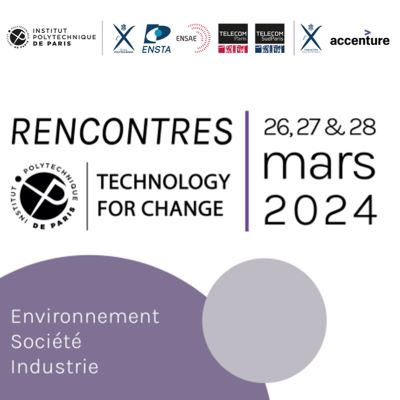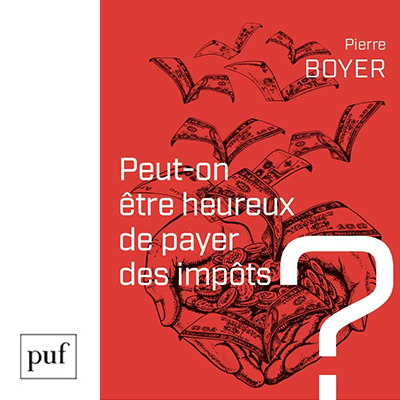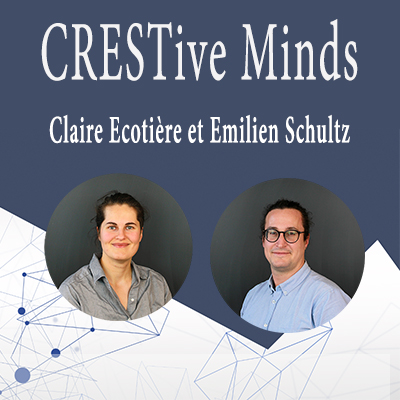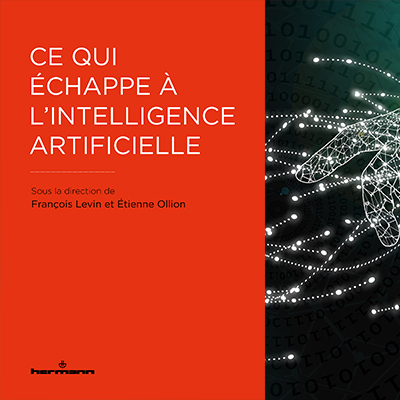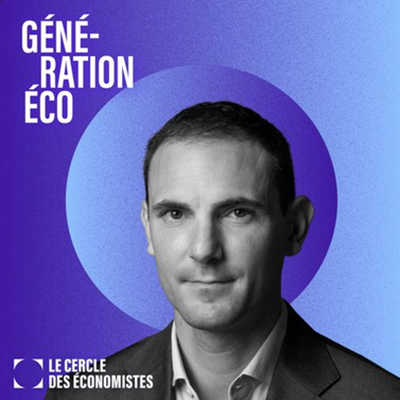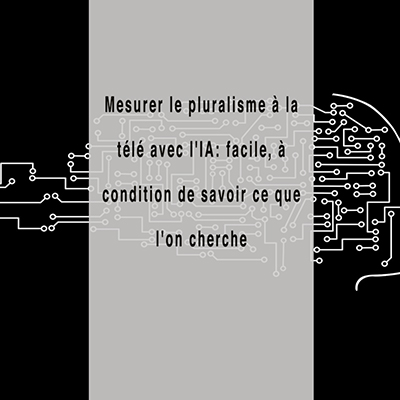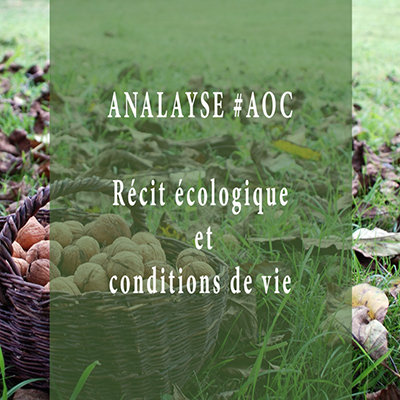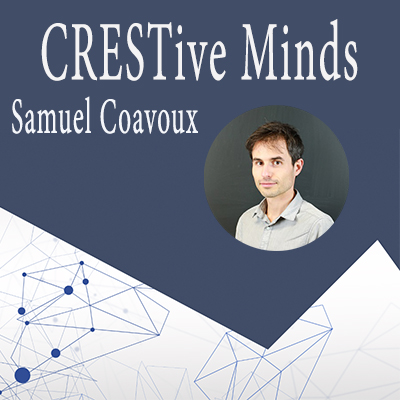
Alicia Bassière is a 4th year PhD student at CREST-Ecole polytechnique in energy economics, specializing mainly in the electricity market, supervised by David Benatia and Peter Tankov.
Alicia is committed to the fight against global warming, focusing on energy as a fundamental component.
For the third edition of the Rencontres Technology for Change, Alicia won second place during the Pitch for Change competition based on the 180-second thesis principle.
Alicia was able to present her thesis work, which involves modeling uncertainty in long-term investments in power generation capacity. In particular, she is working on various sources of uncertainty: electricity consumption, fuel prices, the number of players in the market and renewable production. Alicia uses advanced probabilistic methods for this, which she has popularized as tarot cards.
Beyond her thesis, Alicia is passionate about making economic research and the energy transition accessible to the general public. To this end, she actively participates in events promoting science and collaborates with journalists. In 2022, she joined the TF1 Group’s Committee of Environmental Experts to improve journalists’ understanding of energy and climate issues, occasionally appearing on the French TV channel LCI to share ideas.
As part of her scientific activity, Alicia Bassière is working on several research projects, jointly with her thesis supervisors:
– Moving forward blindly: capacity planning, uncertainty and environmental targets (joint work with David Benatia)
– A mean-field game model of electricity market dynamics (joint work with Peter Tankov and Roxana Dumitrescu).
Discover more of Alicia Bassière on her website: https://sites.google.com/view/alicia-bassiere/accueil?authuser=0
Sortie : “Peut-on être heureux de payer des impôts ?” un livre de Pierre Boyer, publié aux éditions PUF
Collection : Défis Économie
Date de parution : 03/04/2024
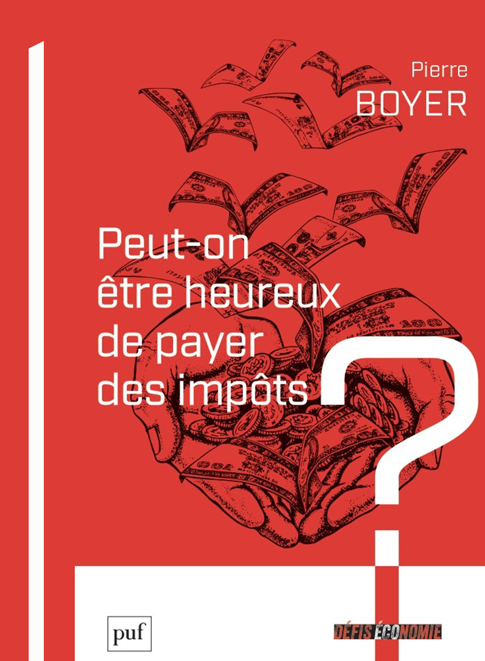
Résumé :
Peut-on être heureux de payer des impôts ? La réponse qui s’impose semble ne pouvoir être que négative. On peut même se demander si ce titre ne constitue pas une provocation.
Pierre Boyer, sélectionné pour le Prix du meilleur jeune économiste, montre que la relation des citoyens-contribuables à leurs impôts est complexe, et qu’il est possible de vivre « heureux » dans un pays à haute pression fiscale. A la condition toutefois de connaître les fragilités du consentement à l’impôts, de ne jamais le considérer comme acquis.
A l’appui d’enquête et de résultats inédits auprès de la population française, ce livre propose des manières concrètes pour améliorer ce consentement et pour rendre peut-être moins amers d’en payer.
https://www.puf.com/peut-etre-heureux-de-payer-des-impots
La presse en parle :
https://www.lenouveleconomiste.fr/librairie/peut-on-etre-heureux-de-payer-des-impots/
https://www.lesechos.fr/idees-debats/livres/vers-la-felicite-fiscale-2087877
https://news.dayfr.com/local/3673787.html
https://www.lesechos.fr/idees-debats/livres/vers-la-felicite-fiscale-2087877
https://www.la-croix.com/a-vif/impot-participatif-propose-par-gabriel-attal-une-bonne-idee-20240820
https://www.humanite.fr/en-debat/economie/impots-des-contribuables-heureux
https://www.radiofrance.fr/franceinter/podcasts/le-5-7/le-5-7-du-lundi-19-mai-2025-4281356
CRESTive Minds – Episode 5 : Claire Ecotière and Emilien Schultz, new data engineers at CREST
Claire Ecotière and Emilien Schultz recently joined CREST team as data engineers. We wanted to take this opportunity to highlight their activities and what they could bring out to CREST researchers.
- Claire, you have joined CREST by the end of 2023 and Emilien you arrived in the beginning of 2024. Could you introduce yourselves, where are you from? What did you do before joining CREST?
Claire > I am originally from the Paris region, and I pursued a mathematics curriculum with the learning of several programming languages. My academic path led me to pursue a thesis in applied mathematics at CMAP[1] at Polytechnique focusing on modeling human behavior in the context of climate change. During my thesis, I was able to deepen my appetite for coding and interaction with researchers. I defended my thesis at the end of October, just before starting at CREST in early November 2023.
Emilien > Before joining CREST as a data scientist, I had several lives. Initially trained in applied physics at ENS Paris-Saclay, I defended my PhD thesis in sociology at Paris Sorbonne in 2016 on research policies. I then conducted research in social sciences of health for several years, with a focus on cancer area. With the COVID-19 outburst, I got involved in research studying controversies on science and medicine in the public space. Through all these activities, I maintained a common thread of interdisciplinary collaborations on digital data. This led me to get involved in a reflection on scientific programming in Python for data analysis, ranging from statistical methods to software development. It led me to publish a handbook in 2021 on Python for the social sciences[2]. It was a milestone in my journey to connect data, programming, and social sciences, which I’m fortunate enough to continue by joining GENES[3] and CREST.
- Why is it necessary and promising for a research laboratory like CREST to support researchers in the production and analysis of data?
Claire > In reality, the use of data is crucial for anchoring a research question. When discussing data, it’s imperative to consider the context in which they were acquired, including potential biases or quality. Some research questions may gather data through surveys or economic games. With the experimental laboratory (IPEL) here at CREST, I can produce experimental data. I can code the experiment, run the experiment online or here at CREST and help with the data management. By encouraging data production and analysis at CREST, we aim to improve the traceability and quality of the data used, thereby enhancing the resulting research.
Emilien > Data is consubstantial with scientific activity. But the word itself can be rather misleading, as it encompasses very different approaches and entities. When we talk about data these days, what we really mean is the proliferation of digital data and the IT tools required to process it. The acceleration and new constraints on research activities mean that new professionals need to intervene in the scientific work, whether to provide IT services, specialize in digital approaches to different disciplines, or build and deploy new software tools. While many researchers develop their own expertise in these approaches, in some cases this can be a heavy investment, both in terms of time and work. So, it’s worthwhile for a laboratory to facilitate both use and development, by helping with the more technical aspects.
- (Claire) How do you plan to proactively engage with researchers to identify potential areas where your skills could enhance their work?
I can assist researchers on two fronts:
- data production through testing economic models
- data analysis.
Both aspects are essential in the study of a research question. Therefore, I plan to disseminate my support to researchers through discussions and presentations.
First concerning the production of data, I can help the researchers or handle their production.
Second, helping with data analysis can save time for the researcher.
Furthermore, based on successful projects, I will redefine my offer and the methodology.
- (Emilien) How do you plan to initiate conversations with researchers to identify opportunities where computational social science methods can enhance their studies?
I have the feeling that the role of facilitator of research on digital data should intervene on two levels.
The first is to help answer questions already existing, and bring them to an operationalization strategy: indeed, researchers are specialists in their field, and see the arrival of new methods, whether using new data or software. The challenge is to assess feasibility and to map out available resources. So, they already have questions, and are looking for answers. It’s a good idea to have a door to knock on, to discuss and clarify these questions and needs as much as possible.
The second level is to open the space of possibilities, especially for research that’s just starting out. I think the best way to do this is to regularly present uses and tools in the form of continuous monitoring from a discovery angle, providing resources to take things further for those who want to dig deeper. This can be achieved by hosting events specifically devoted to digital methods, be they practice groups or dedicated seminars.
- Can you share an example of how you’ve successfully collaborated with researchers in the past to encourage them to explore new data-driven approaches?
Claire > During my doctoral studies, I collaborated with researchers. As my position at CREST marks the beginning of my post-doctoral career, this question is premature. I fully intend to develop collaborations at CREST and address this matter next year.
Emilien > My philosophy is always to start from needs. For example, I have often helped to transform existing data into a format suitable for specific software, for example in language processing or network analysis. I have also been involved in setting up data collection protocols (e.g. web scrapping). In some cases, when there was a need for a ready-made tool, I developed small applications that could easily be used for processing, thus facilitating the exploration of a dataset. More recently, I’m trying to help you choose the right strategies for processing textual data, because with the advent of language models, the range of existing tools has greatly expanded.
- How do you plan to make your expertise and the potential of data more accessible to researchers who may not have a strong background in data science?
Claire > In the realm of data production and analysis, my primary tools include: the otree package in Python, Stata, R, and data-lab servers. I aim to foster the growth of experiments at CREST. To achieve this, it’s crucial to offer training sessions on the usage of these tools and develop comprehensive documentation. Another approach would involve delivering simplified presentations on various projects conducted, elucidating the significance of conducting experiments at CREST.
Emilien > Before you can process data, you first need to want to do it, and then you need to find the means to do it. Digital tools are constantly evolving, especially in the context of open source. This means that you have to keep up to date. I’m convinced that there are two different aspects to this: the first is to enable everyone to have a basic culture of digital data processing; the second is to be able to help to identify relevant materials to progress to autonomy. I therefore believe it’s important to provide ongoing training in data processing practices, so that everyone can get started when they want, in particular through regular training courses on tools (programming basics, the command line, code versioning, notebooks, etc.), and to plan a personalized exchange on needs to guide people towards the most appropriate resources.
- Are there specific strategies you employ to encourage researchers to consider new or more recent options into their projects?
Claire > I rely on word of mouth and presentations within the economics cluster. I plan to interact more with the sociologist too as my work can be helpful for them. Knowing that an option exists is crucial in considering a change. I’ve already begun launching experiments, and I count on these successful examples to persuade those who might be interested in conducting experiments. Additionally, I’ve drafted procedures to illustrate how collaborations are structured and what researchers stand to gain from them.
Emilien > I don’t know if you’d call it a strategy, but my priority is to use the data already available to open new perspectives. There’s nothing like a little demo to open the possibilities and make people want to dig deeper. I’m also a fervent supporter of open source and open science, although I’m also convinced that more proprietary approaches are needed in certain cases. Whenever I can, I try to show examples of work that makes the most of the tools. Ideally, well-conducted data processing can lead to three types of use: scientific publications, datasets, and processing steps that enable reproducibility.
- Given the interdisciplinary nature of CREST, how do you see yourself collaborating with researchers from diverse fields to create new connections and exchanges around digital strategies to their projects?
Claire > I am keen to collaborate with all researchers interested in conducting experiments or data analysis. While these experiments may vary in form, fundamentally, they involve researchers with a research question and a desire to gather data to enhance their study. My work can be readily offered to various domains within CREST.
Emilien > I had some experience to talk to different communities, both inside and outside social sciences. I find that the central challenge is to find a common language while accepting that each field comes with its own questions and concepts. Such an exchange is facilitated to some extent by the existence of a common culture of digital tools coming from software engineering. However, this common language has its limits. Indeed, software and packages are often specific to particular disciplines or even currents. It is therefore necessary to take the time to identify the usual tools already in use, in order to propose an appropriate response. It’s impossible to do it without a minimum of discipline-specific knowledge. For example, some communities only use R, so it’s not possible to switch everything over to Python. On the other hand, it may be worthwhile to build a small program to perform the task in question, if it has to be done in Python. In other cases, specific software is used, and it’s not possible to replace it. So we have to find a way to make it works!
- Recently, who did you interact with and what were the conclusions and results? Were you satisfied with them?
Claire > Since I began, I’ve been collaborating with the GENES IT team to revive the experimental laboratory, which had been dormant for two years. Recently, we successfully conducted our first experiment. I engage daily with researchers to develop upcoming online experiments. Additionally, I’ve assisted in analyzing data collected in Japan. Each of these experiences has been positive and has enabled me to better understand the needs of CREST. This allows me to expand the range of possibilities I plan to offer to CREST researchers.
Emilien > Since my arrival, I’ve had the opportunity to immerse myself in some of CREST’s activities, particularly in computational social sciences. I still have a lot to discover, but I’ve already had rich exchanges with researchers and PhD students from the laboratory. Claire and I have also started to create an interface with the GENES IT team, which developing and providing tools adapted to research needs. I’m going to try to feed this exchange as much as possible, by circulating information and problems encountered. In the coming months, I’ll be continuing to observe and consult the laboratory’s researchers, to be able to build up a relevant training offer ranging from the fundamentals of digital tools (such as using Jupyter notebooks or command line interface) to more advanced approaches such as prototyping apps. I hope to be able to do this in collaboration with those who already use those tools, and as such I try to take every opportunity to exchange ideas. An important point will be the presentation of the Onyxia Datalab by the GENES IT team on May 2, at 1:30 pm, which will already provide a first opportunity to launch a discussion on tools and needs. We look forward to seeing you there.
[1] Center for Applied Mathematics, https://cmap.ip-paris.fr/en
[2] https://pur-editions.fr/product/7857/python-pour-les-shs
[3] Groupe des Ecoles Nationales d’Economie et Statistique
Sortie : “Ce qui échappe à l’intelligence artificielle” ouvrage dirigé par François Levin, Étienne Ollion, publié aux éditions Hermann
Paru le 27/03/2024
Collection : Philosophie, Politique et Économie
Thématique : Sciences humaines, philosophie, religion
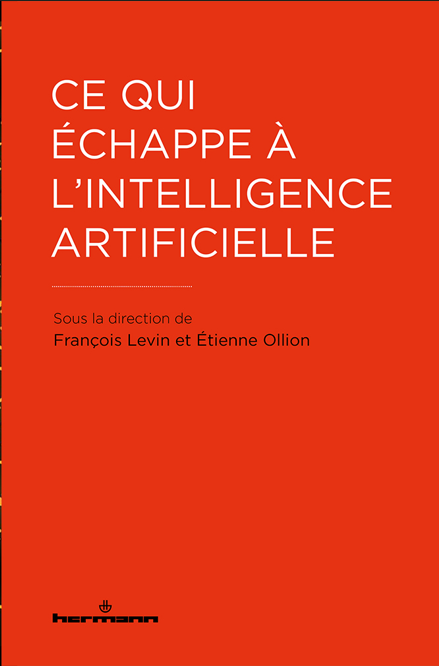
Présentation :
L’intelligence artificielle est désormais partout, et son développement semble ne connaître aucune limite. Pas un mois ne se passe sans qu’une frontière que l’on pensait insurmontable ne soit allègrement franchie.
Plutôt que de se demander quelle sera la prochaine à être dépassée, ce livre interroge sur ce qui échappe, de manière profonde, à l’IA. Existe-t-il des bornes absolues, au-delà desquelles l’IA ne pourrait se rendre ? Des domaines de la vie qui lui seraient inaccessibles, comme l’amour, la colère, la pensée, la création, la rencontre, la signification ? Ou ces états sont-ils simplement des bornes contingentes, prêtes à être outrepassées grâce au flux de données et à la puissance des algorithmes d’apprentissage machine ? Mais peut-être que la distinction se joue encore ailleurs, non dans des domaines spécifiques, mais dans une certaine expérience du monde qui différerait fondamentalement entre l’humain et la machine.
Pour répondre à ces questions, et afin de comprendre pourquoi nous tenons tant à déterminer des limites à l’intelligence artificielle, ce livre rassemble des contributions interdisciplinaires : recourant à la philosophie, aux sciences sociales et à l’informatique, il tente de donner un sens au sentiment d’étrangeté que nous ressentons face au développement fulgurant des dispositifs intelligents.
Plus d’informations : https://www.editions-hermann.fr/livre/ce-qui-echappe-a-l-intelligence-artificielle-francois-levin
Le Cercle des Économistes : une interview de Pierre Boyer pour le podcast Génération Économie.
Dans ce nouvel épisode de Génération Économie, nous recevons Pierre Boyer, professeur à l’École polytechnique, directeur adjoint de l’Institut des Politiques publiques, nominé en 2023 au Prix du meilleur jeune économiste français, décerné par le Cercle des économistes et le journal Le Monde. Avec lui, Amédée, étudiant en master comptabilité – contrôle audit et membre du projet jeunesse du Cercle des Économiste.
25 mars 2024
Unveiling Gender Inequalities
In the dynamic landscape of gender equality, the respect for women’s rights has become a constant global endeavor. Within CREST, researchers and PhD candidates actively engage in understanding and studying gender inequalities, whether in the fields of economics or sociology. This article explores CREST’s research work, highlighting nuanced perspectives and innovative methodologies to study these societal and academic issues.
Sociological Perspectives
![LéaPessin[1]](https://crest.science/wp-content/uploads/2023/09/LeaPessin1.jpg)
In sociology, Léa Pessin‘s recent article focuses on gender inequalities in domestic tasks. Analyzing how couples in the United States navigate changes in women’s roles in the workforce while balancing career and family needs, Pessin’s research goes beyond the usual focus on specific aspects of work or family.
This innovative approach identifies that in 2019, only 14% of different-sex couples in the United States adopted an egalitarian division of labor, where each partner works full-time and shares domestic tasks equally. This result underscores that the time dedicated to domestic tasks, crucial for family functioning, is often invisible and undervalued, presenting a genuine social challenge for gender equality.
Joining CREST-GENES-ENSAE Paris in September 2023, Pessin’s work focuses on the unequal consequences of the gender revolution on women’s work and family outcomes, considering social class, race, and context. She recently received the prestigious ERC Starting Grant for the WeEqualize project, debuting in September 2024. WeEqualize adopts a historical and comparative approach to examine the implications of the gender revolution on social inequalities in work-family strategies among different-sex couples across countries and periods.
Find out about Léa Pessin’s recent publication: Gender Equality for Whom? The Changing College Education Gradients of the Division of Paid Work and Housework Among US Couples, 1968–2019
Economic Perspectives
In economics, Béatrice Cherrier, associate professor at CREST-CNRS, works on exploring the history of economics, highlights women economists. Demonstrating that the current recognition of women in the economic profession is not recent and has its roots in the 1970s, Cherrier’s research challenges the idea that, until recently, the prominent thinkers and practitioners in economics were exclusively men.
In collaboration with co-authors, her publication “Economic is not a Man’s Field: CSWEP and the First Gender Reckoning in Economics: 1971-1991” explores the history of gender recognition through the archives of the American Economic Association. Beyond supporting women economists, gender inequalities are a recurring theme at CREST among studies developed by PhD candidates in economics and sociology.

Doctoral contributions

Léa Dubreuil, in her third year of doctoral studies at CREST-GENES-IP Paris, specializes in labor economics and gender inequalities, with a particular focus on women’s behavior in the labor market following childbirth. Her work revolves around two specific projects related to gender inequalities:
With Bertrand Garbinti and Carole Bonnet, their research focuses on inequalities in the labor market between women and men after the birth of the first child. They observe a significant decline in wages and hours worked for women compared to men. The uniqueness of this project lies in the ability to examine what happens within a couple.
In collaboration with Marion Brouard, Léa’s project explores the reasons for the decrease in the number of hours worked by women after the birth of the first child. They examine how mothers’ preferences for personally caring for their children can explain the rate of part-time work among mothers and their behavior regarding family public policies.
Federica Meluzzi, a fourth-year doctoral student at CREST-GENES-IP Paris, also works on labor economics and public economics, with a focus on gender differences in the labor market. Specifically, her work addresses differences in job search behavior between the sexes, the influence of social norms, and the role of parental policies on equality within couples.
In an article, currently in the final stages and titled “The College Melting Pot: Peers, Culture and Women’s Job Search,” she presents large-scale evidence on the effects of the social environment, represented by university classmates, on women’s job search behavior and career choices.
Federica relies on administrative and survey data covering all university graduates in Italy, combined with quasi-random variations in gender norms among peers, measured by the local characteristics of the province of origin.
Her results indicate that exposure to classmates with a more egalitarian gender culture leads to significant increases in women’s labor supply, both through greater acceptance of full-time jobs and increases in their working hours. Analysis of original data on students’ beliefs reveals that the main mechanism at play is that of social learning.
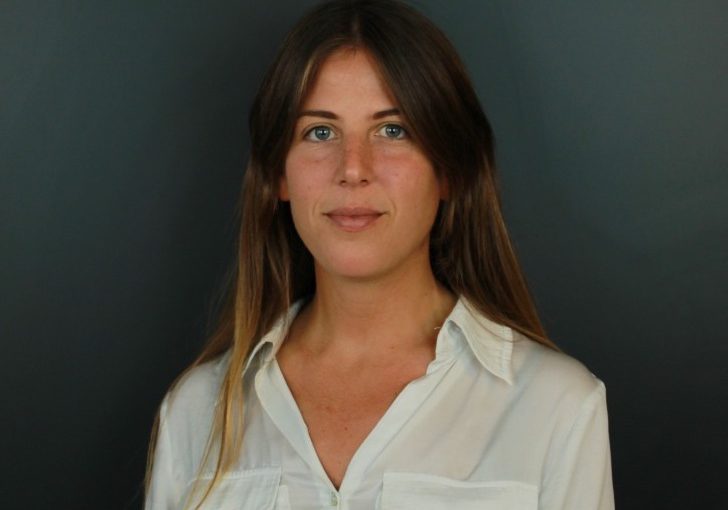
Gender Inequality Discussion Group
CREST’s PhD candidates remain committed to highlighting gender inequalities and advocating for women’s rights. The “Gender, Family, and Sexuality” reading group, initiated by economics and sociology PhD candidates, promotes discussions on research articles, whether original or not.
With 26 participants (professors, PhD candidates, and research assistants), this interdisciplinary reading group facilitates exchanges on current gender-related topics, presenting innovative sociological and economic results and methodological tools.
While the developed research represents only a sample of the undertaken projects, it is crucial to emphasize that CREST’s research is not limited to isolated initiatives. Moreover, these studies rely on innovative tools and approaches. These innovative methodologies (new data, new data analysis techniques) form the foundation for significant advancements in both societal and academic domains, such as advancing women’s rights by deciphering gender inequalities.
CREST approaches gender inequalities with a multidisciplinary perspective. These efforts contribute not only to shedding light on crucial questions in fields such as economics and sociology but also actively shaping the landscape of gender inequality research.
Les accords de libre-échange, un coupable idéal bien pratique
Stéphane Auray, professeur d’économie à l’ENSAI et chercheur au CREST, apporte son éclairage dans cet article du magazine Pour l’Eco.
Le 22 février 2024
Mesurer le pluralisme à la télé avec l’IA : facile, à condition de savoir ce que l’on cherche
Dans son article pour le journal Les Echos, Stéphane Loignon interview Étienne Ollion, chercheur en sociologie au CREST.
Publié le 4 mars 2024
Récit écologique et conditions de vie
Une analyse d’Ivaylo Petev, Philippe Coulangeon, Yoann Demoli et Maël Ginsburger pour le quotidien AOC.
Mardi 5 mars 2024
CRESTive Minds – Épisode 4 – Samuel Coavoux
Researcher portrait: Samuel Coavoux, assistant professor at CREST-ENSAE Paris.
What is your career path?
After my PhD, I worked for five years at Orange, a leading French telecommunication company, as a digital sociologist. Orange is one of the few French companies to have a whole team devoted to social scientific research, something that is quite common elsewhere. I did research on various themes, like cultural consumption, platform work, and digital advertisement.
Why did you study sociology?
I majored in Political Science and East Asian Studies, and originally wanted to work in the media. I started reading and studying social science books seriously on an exchange program in Kwansei Gakuin University in Japan. I was a bit lost in translation and social sciences was a good way to understand what was going on around me.
When I came back, I applied for a Master Program in Sociology at the Ecole Normale Supérieure de Lyon, where there were a lot of sociologists of culture.
Your co-authored “La fin du Game. Les jeux vidéo au quotidien” (Endagme. Videogames and daily life) published by Presses Universitaires, shows that video games audiences are different than what we usually think. Can you tell us more about this?
This was a collective project led by Hovig Ter Minassian. We did a national representative survey of videogame practices in France, among the 11+ population.
Our first aim was to broaden the dominant view of videogames as a young, male, working-class activity, a view that is aligned with how “gamers”, people whose social identity incorporates videogame playing, define what true games and true gaming is.
In this view, there are “real games” that are difficult, challenging, engaging, and mere entertainment.
We show that taking all digital games seriously yields very different estimates on the prevalence of video games: about 60% of the population, and virtually 100% of teenagers, engage in digital games, be they “casual” smartphone games (e.g. Candy Crush), light party games (e.g. Mario Kart), or hardcore video games (e.g. League of Legends). This is about 20 percentage points above what previous surveys have measured by asking respondants not if they played video games, but if they were video games players. There is a large difference between identity and practice.
Have you noticed any correlations between video game playing and demographic properties?
When we look at the details, there are many differences in practice, intensity, and diversity of video game playing. Age is the best predictor. Gender is also very important: men are more likely to play, and to play frequently, than women at every age — but young girls are still much more involved in video games than adult men. They also play different kind of games, with action, adventure, sports, and strategy games being more masculine.
Social class and education are not very correlated with intensity of frequency, but they are linked with device choice: working class players favor consoles and upper-middle class players favor computers. This is linked with professional uses of computers and is a divide that might increase, as we are seeing that, with the massification of smartphones, rates of computer equipment are actually declining among the working class. In that sense, video games are linked with digital inequalities.
You have also been studying digital consumption in other settings, such as music. In a recent paper, you start with a puzzle: why is YouTube the leading platform for music consumption even though qualitative research show that music consumers do not look at the videos. Can you tell us why?
This was intended as a case study in environmentally inefficient consumption practices, with my colleage Jean-Samuel Beuscart.
Streaming videos are about four times as energy consuming as the equivalent audio track. If one does not watch the video but only listens to the sound, this energy is wasted. The total impact is very small compared to that of cars, planes, or cattle and we are not suggesting regulating access to digital music. But is is interesting to look at the reasons why some sociotechnical configurations persist even though there are clear alternatives (Spotify or Deezer perform the same service as YouTube).
We show that YouTube can be framed as a free and open listening platform (especially to casual listeners), as an efficient soundtracking device in many contexts, and as a useful complementary listening and music sharing device, and that, as a consequence, is better adapted to some consumption contexts.
Your recent research focuses on algorithms and their effects on consumption. It is often said that platforms trap consumers into filters bubbles. Is that the case?
The literature has produced mixed results and the picture is not very clear. It seems more and more that is is not the case: platforms are actually a bit more diverse than real life interactions. I am studying this in various ways.
With Abel Aussant, we are using survey data and matching techniques to estimate the effect of digital consumption on the diversity of tastes and we see a small, positive, significant effect: using digital platforms actually increases diversity in cultural consumption, which we measure with the number of different movie genres people watch, or music genres they listen to.
In another project, with platform data, I also show that the music chosen by algorithms is a bit more diverse than that we tend to focus on when we choose what to listen to.
Finally, with Jean-Samuel Beuscart, we take a qualitative look at what it means to use algorithms. The literature insists on jow they threaten people’s agency, because they are the one choosing what we will hear. This is not that new – radio stations play a large part in deciding what music people listen to. We show that consumers usually use algorithms knowingly, when they prefer to delegate choice, because they are focusing on something else, and because having to choose among a very large catalog can be a burden in many situations.
Related literature
Hovig Ter Minassian, Vincent Berry, Manuel Boutet, Samuel Coavoux, Isabel Colon de Carvajal, David Gerber, Samuel Rufat, Mathieu Triclot et Vinciane Zabban (2021), La fin du game ? Les jeux vidéo au quotidien, Tours, Presses Universitaires François Rabelais.
Jean-Samuel Beuscart, Samuel Coavoux & Jean-Baptiste Garrocq (2023). “Listening to music videos on YouTube. Digital consumption practices and the environmental impact of streaming”. Journal of Consumer Culture, 23(3).
Samuel Coavoux, Abel Aussant (2024), “The Netflix Omnivore. The effect of streaming platforms on cultural diversity and inequalities“, PrePrint
Click here to access Samuel Coavoux’s Personal website

